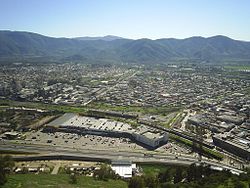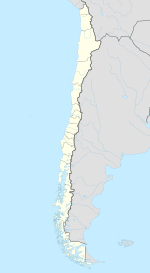La Calera, Chile
| La Calera | ||||
|---|---|---|---|---|
| City and Commune | ||||

Downtown La Calera from the hills
|
||||
|
||||
| Coordinates: 32°47′12″S 71°11′50″W / 32.78667°S 71.19722°WCoordinates: 32°47′12″S 71°11′50″W / 32.78667°S 71.19722°W | ||||
| Country | Chile | |||
| Region | Valparaíso | |||
| Province | Quillota | |||
| Founded | 1844 | |||
| Government | ||||
| • Type | Municipality | |||
| • Alcalde | Eduardo Martinez Machuca (PPD) | |||
| Area | ||||
| • Total | 60.5 km2 (23.4 sq mi) | |||
| Elevation | 183 m (600 ft) | |||
| Population (2012 Census) | ||||
| • Total | 50,221 | |||
| • Density | 830/km2 (2,100/sq mi) | |||
| • Urban | 47,836 | |||
| • Rural | 1,667 | |||
| Demonym(s) | Calerano | |||
| Sex | ||||
| • Men | 24,134 | |||
| • Women | 25,369 | |||
| Time zone | CLT (UTC-4) | |||
| • Summer (DST) | CLST (UTC-3) | |||
| Area code(s) | 56 + 33 | |||
| Website | Official website (Spanish) | |||
La Calera is a city and commune in the Quillota Province of central Chile's fifth region of Valparaíso.
La Calera is located 66 km (41 mi) northeast of Valparaíso, and 118 km (73 mi) northwest of Santiago, in the Aconcagua River Valley. Its area is 60.5 km2 (23 sq mi). La Calera borders Nogales to the north and west, Hijuelas to the east, and La Cruz to the south.
The city of La Calera is partly enclosed by Route 5 and Route 60.
La Calera's name comes from the production of quicklime (Spanish "cal") that is obtained from the processed limestone (Spanish: piedra caliza) (calcium carbonate), extracted from the hills at the south of the town, which were already exploited by the Chilean and Peruvian Natives for some 400 years previously. Therefore, La Calera means "quicklime mine".
The estate of La Calera belonged to the Jesuits up to 1767. The turning point came in 1842, when it was acquired by Bolivian citizen Ildefonso Huici, who started industrialising it with local products. By 1844, a small town had emerged consisting mainly in a number of workers' dwellings located around the factories and production centres established in it, giving life to what La Calera is today.
Due to its strategic crossroads location on the central valley and the pioneering and entrepreneurial work of locals and immigrants (Palestinian immigrants, Germans, Italians), La Calera has managed to remain a significant commercial and services centre to the interior of the Valparaiso Region, even though it is not the capital city of the Province. It also remains an important industrial base, employing a fair share of the rural population around it.
...
Wikipedia


